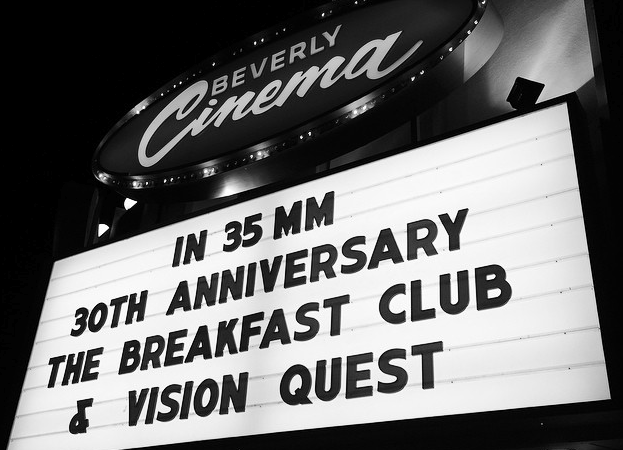Revisiting The Breakfast Club

Any self-respecting child of the ’80s loves John Hughes and knows at least one of the writer-director’s films by heart. While “Sixteen Candles” and “Ferris Bueller’s Day Off” are a total blast, the Hughes movie that mattered to me most growing up was “The Breakfast Club,” and it remains one of my favorites today.
So when I saw that the New Beverly Cinema here in Los Angeles was showing “The Breakfast Club” 30 years to the day after its original release — alongside “Vision Quest,” which also came out on Feb. 15, 1985 — there was no way I could miss it. While I’ve seen the film a million times thanks to cable and videotape, I hadn’t watched it in an actual theater with other people since it opened. I can still vividly recall walking into a packed auditorium at the UA Warner Center in Woodland Hills on the Friday night it came out; we arrived a little late and missed the first few minutes, but the energy in that room already was infectious. Something was different about this night.
Last night, I was curious to see what it would be like to watch “The Breakfast Club” in a theater packed with people in their 40s just like I am, all of whom know every word, every beat and every punch line just like I do. It wasn’t a “Rocky Horror”-style exercise in cinematic interaction, but there was a definite sensation that we were all aware when a classic line was coming up:
“Does Barry Manilow know that you raid his wardrobe?”
“Don’t mess with the bull, young man, you’ll get the horns.”
“No, I don’t wear tights. I wear the required uniform.” “Tights.”
“She lives in Canada. I met her in Niagara Falls. You wouldn’t know her.”
“No! I never did it!” “I never did it either. I’m not a nymphomaniac, I’m a compulsive liar.”
But I was also curious to see, from the perspective of being a film critic, whether revisiting “The Breakfast Club” would be more about the comforting tug of nostalgia than the allure of actual quality. And the answer is: It was a combination of both.
Quick plot summary, for the two or three people out there who’ve never seen “The Breakfast Club”: Five suburban Chicago high school students representing various stereotypes — a brain (Anthony Michael Hall), an athlete (Emilio Estevez), a basket base (Ally Sheedy), a princess (Molly Ringwald) and a criminal (Judd Nelson) — are forced to spend a Saturday in detention together. The comedy of their initial awkwardness gives way to drama as they break down each others’ identities, followed by the uplift of their unexpected bonding.
I’m happy to report that, three decades later, “The Breakfast Club” remains timeless. It still reflects the narcissistic torment of teen angst: the feeling that nobody understands what you’re going through (certainly not your parents) and that your troubles are all-encompassing and insurmountable. It’s still consistently funny and endlessly quotable. Hughes had an unparalleled knack for writing teenagers — hyper-verbal characters full of self-aware, sharp humor who were also capable of making themselves vulnerable and revealing their hearts. It’s paced beautifully and moves seamlessly in tone from light moments to heavier ones.
But along those lines, the drama seems more melodramatic to me now that I’m a grown-ass woman with a child of my own. This is especially true in the big, cathartic scene once the characters have bonded over smoking pot (a device which has become a total cliche by now) and revealed what they’ve done to earn detention. Estevez’s cries of “Win! Win! Win!” and Hall’s sobbing into his sweatshirt sleeve feel over the top now and even a little cringe-inducing.
Yet there’s also a timelessness to the look of the film, especially compared to so many 1980s movies which seem so hilariously dated with their teased-up bangs and giant shoulder pads. And I wonder whether that was intentional on Hughes’ part — whether it was an attempt to make these people and their feelings universal. The characters’ clothes could really come from any time — especially Estevez’s hoodie and jeans and Nelson’s flannel shirt and clunky boots — but “The Breakfast Club” also refrains from the sorts of pop-culture references that proliferate teen movies today, which would peg it to a specific period. Nelson cracks a joke about Barry Manilow, but it’s in the context of tooling on the uptight assistant principal (Paul Gleason) rather than an attempt to seem hip.
Speaking of which: I never realized until last night how cute Nelson was back then — I was always more attracted to Estevez’s more clean-cut looks — or the fact that he was 26 years old playing a high school student.

Excellent article. Me and my girlfriend love this film, and while we weren’t even born when it came out, we can’t help it but let ourselves be absorbed by this 80s Hughes classic.
My girlfriend and I*